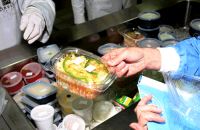 Lebanon’s food is considered a national treasure, and the country’s cuisine is appreciated worldwide. Local people and visitors love to search for the best of the best, from the tastiest kebabs at a simple roadside stand to high cuisine at sophisticated restaurants. However in recent years Lebanon’s government has observed an increase in foodborne illnesses, which shed light on issues in the safety of the food chain.
Lebanon’s food is considered a national treasure, and the country’s cuisine is appreciated worldwide. Local people and visitors love to search for the best of the best, from the tastiest kebabs at a simple roadside stand to high cuisine at sophisticated restaurants. However in recent years Lebanon’s government has observed an increase in foodborne illnesses, which shed light on issues in the safety of the food chain.
Watch the World Health Day video on food safety
A food safety campaign begins
In November 2014, the Lebanese Ministry of Public Health swung into action. Public health officials began surprise inspections of restaurants, slaughterhouses, supermarkets and farms. Subsequently the country’s Minister of Public Health, Wael Abou Faour, announced the names of more than 1 000 establishments with unsatisfactory food sampling or inspection results. Many were cited, in particular, for unsafe meat and dairy products. Some were shut down, pending completion of needed improvements and re-inspection.
The campaign triggered a ripple effect. Now more actors across the food chain are considering the merits of food suppliers. Consumers are more alert to the food they buy and eat, establishments are reinforcing their own internal food safety policies and more restaurants are seeking international food safety certification from the International Organization for Standardization.
Regulation enacted alongside the campaign
The food safety campaign has also provided an opportunity to reinforce the regulatory authority of the Ministry of Public Health, in a country that has had its government challenged by a series of crises. The campaign also encouraged closer collaboration with other ministries including the Ministry of Economy and Trade.
Lebanon already had a draft food safety law on the books, but in 2014 the law was reactivated and presented to the parliament’s Joint Committees for approval. The new law, which was approved, will ensure synchronization and consistent application of rules through all points of the food chain, from farm to plate; and boost ministerial coordination on food safety.
“We are keen to ensure the continuity of the campaign, which has become a sustainable administrative task that will not stop with a change of ministers,” Abu Faour said at a news conference. “I hope we are laying the groundwork for the permanent procedures of food safety in this country.”
WHO support
All this activity and newfound commitment has enhanced the Ministry of Public Health’s normative work. Food inspection checklists have been updated in accordance with the Codex Alimentarius, and training of public health inspectors has been ramped up. WHO supported the Ministry of Public Health food safety drive by providing workshops and training to more than 200 public health inspectors on standard food sampling and inspection based on good manufacturing practice and WHO standard check lists.
World Health Day 2015 will highlight the importance of food safety, under the theme of “From farm to plate, make food safe.” WHO’s campaign aims to raise awareness on the need for greater action by all involved in the food chain to ensure the safety of food, from production to consumption and the many steps in between. World Health Day is celebrated every year on 7 April.







